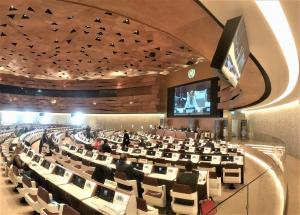
Some 50 transport ministers and leaders from around the world joined delegates from over 90 countries for the 75th anniversary session of UNECE’s Inland Transport Committee (ITC) to celebrate its unique accomplishments and depict a picture of the Committee’s future.
In her keynote address, Ms. Simonetta Sommaruga, former President of the Swiss Confederation and Head (Minister) of the Federal Department of the Environment, Transport, Energy and Communication, emphasized that “The transformation of mobility is essential if we want to reach the Sustainable Development Goals of the 2030 Agenda. This is a question of protecting the environment and people... Over the 75 years of its existence, the Committee has become the UN platform for inland transport.” She highlighted that today, 59 agreements and conventions provide a framework for the development of international road and rail transport, for inland navigation, intermodal transport, as well as the transport of dangerous goods and vehicle construction.
To commemorate the anniversary, UNECE launched the publication “75 Years of Inland Transport Committee – 75 Documents that Changed the World of Transport”, which tells the story of the ITC and its evolution from 1947 when it was founded in the aftermath of WWII to oversee the reconstruction of transport within Europe, to today where the Committee manages the most significant legal instruments in the history of inland transport. These legal instruments, which are among the 75 documents featured, have shaped inland transport throughout the globe making it safer, more sustainable, and more inclusive.
“Sustainable transport is a key element of promoting sustainability, and the Inland Transport Committee is an established asset. As the only United Nations body specializing in inland transport, the ITC has a major role in shaping the international regulatory framework for inland transport and leading the global drive for more coordination, harmonization, and agreements among governments,” stated UN Secretary-General Antonio Guterres.
Building on this legacy, this session also focused on continuing the important work that the committee is currently doing to help global transport adapt to and recover from the impacts of the Covid-19 pandemic. Following the opening address, three panel discussions took place focusing on the important work ITC is currently undertaking to face the current global challenges, and how to seize the work in dealing with these challenges to create a future of sustainable, safe, interconnected transport.
“From road safety to climate action, transport cuts right across the 2030 Agenda and its Sustainable Development Goals”, underscored UNECE Executive Secretary Olga Algayerova, reaffirming UNECE’s commitment to supporting countries to continue developing and implementing the harmonized UN transport legal instruments under the ITC’s purview.
The United Nations Economic and Social Council (ECOSOC) recently adopted a draft resolution revising the Terms of Reference for the ITC, recognizing that “The Inland Transport Committee is a United Nations centre providing a comprehensive platform for consideration of all aspects of inland transport development and cooperation, with special attention to inter-regional and intra-regional regulatory governance through the United Nations transport conventions and other means.”
Leaders share experience on key sustainable transport challenges
The first panel focused on connectivity as one of the key pillars of inland transport. The ability to connect countries through inland transport is essential to connecting countries through trade, creating economic growth, reducing poverty, and promoting sustainable development. However, since 2020 we have seen an interruption in connectivity unlike anything during peacetime in history. Transport leaders focused on how the ITC could address the increasingly urgent need to improve international connectivity both through smart and resilient transport infrastructure but also border-crossing facilitation/digitalization innovations.
The second panel focused on the need to redouble efforts to halve global road deaths and injuries, in line with the vision of the Sustainable Development Goals and the Decade of Action on Road Safety (2021-2030). The ITC has a strong focus on road safety, including eight key legal instruments covering issues such as traffic rules, road signs, vehicle regulations, the transport of dangerous goods, and professional driver fatigue. The committee adopted Recommendations on Enhancing National Road Safety Systems.
The third panel focused on climate change, and discussed how the ITC can guide the creation of more efficient, interconnected, sustainable inland transport on the local and regional level reducing overall greenhouse emissions and improving sustainability.
The ITC Annual session continues until Friday.
More information about the 84th annual session of the ITC can be found here.

